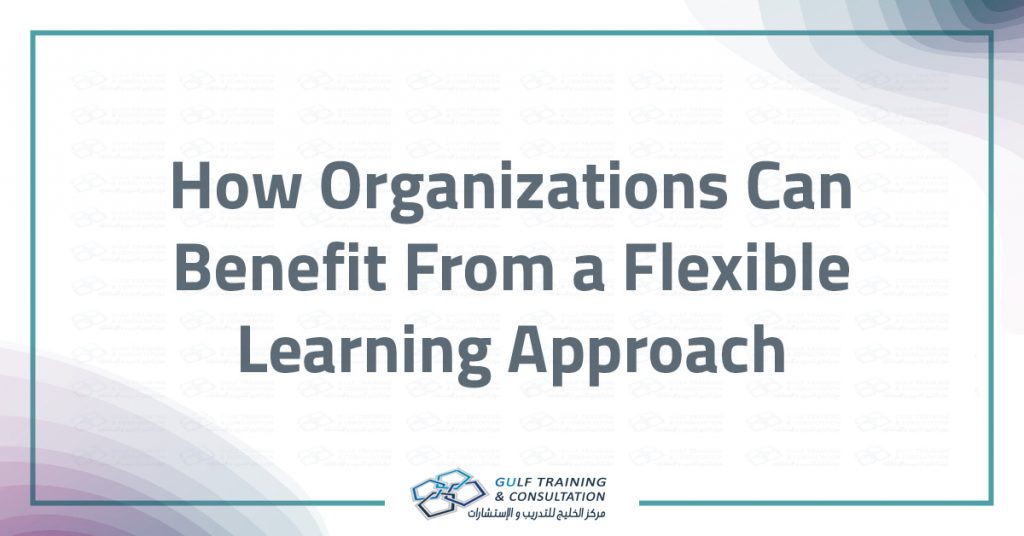How Organizations Can Benefit From a Flexible Learning Approach
How Organizations Can Benefit From a Flexible Learning Approach

L&D and Training professionals are on a continual lookout for new ways to train their professionals and ensure early adoption of flexible approaches to learning.
In essence, this encompasses the implementation of newly learned skills and content in day-to-day activities.
The outcome? Satisfied employees effectively implement organizational strategy and management is motivated to invest in further developing its workforce.
It’s no surprise – schools, universities, and professional development providers are searching for new approaches to provide learning outside the typical learning environment, while organizations are adjusting to more extensive remote working.
The Flexible Learning Approach
Flexible learning by itself represents an adaptable mode of learning that is not necessarily limited by neither space, time, nor pace. In fact, it provides the freedom to customize the learning process as per learner’s needs.
Organizations are quick to realize that the lifeblood of learning rests in its implementation i.e utilizing learning objectives in the workplace, and not necessarily in the type of delivery.
Hence, we are witnessing the wide adoption of both self-paced and instructor-led online learning.
In fact, a recent report by the World Bank and McKinsey shows that online learning has increased from 22% in 2018 to a whopping 27% in 2020.
This looks like a promising upward trend and companies are quick to follow.
Findings show that those who implement their newly acquired skills immediately have progressed immensely in their everyday work and have become more productive.
Flexible Learning
Whether or not organizations employ a flexible learning approach, the recent turn of events prompts this change and is forcing everyone to move with the tide.
However, this flexible way of learning is not entirely new.
In fact, in recent years, flexibility has proven to be a priority.
To demonstrate this, take the UAE as an example: In November 2018, during the UAE Government’s second Annual Meetings, Ministry of Human Resources and Emiratisation launched the National Employment Strategy 2031.
According to UAE’s e-portal, the approach seeks to support the government’s attempts to develop a knowledge-based economy through, among others:
- Promoting lifelong learning programs
- Training on future skills and skill development programs
- Focusing on attracting talent by enhancing knowledge and cultural diversity.
How to Incorporate a Flexible Learning Environment
It’s often challenging to trackback implementation rate post-training, especially if one’s not calculated in measurable and ROI.
With the recent change of unprecedented events, however, HR, L&D, and Training professionals must find new ways to engage employees and keep the learning culture alive within the organization.
In most companies, line managers choose a course for their employees based on their learning gaps, but they can never be too sure that they are implementing what they have learned.
Here are a few ways to implement learning on the job:
- Reconstruct IDPs (Individual Development Plan)
Make sure employees’ development plans are based not only on learning gaps, but also on their everyday work responsibilities, leaving them space to incorporate on the job learning.
- On the job coaching
Line managers do coach their teams, but not on a frequent basis, but rather when the need arises. What if we made daily coaching a thing? Employees would feel more comfortable expressing their weak spots and want to learn from their managers.
- When line managers learn from their employees
Once an organization adopts a more open learning culture, employees can have a more liberated approach to learning, as line managers will understand they can also learn daily.
Types of Learning Programs
Kornferry states that ‘Individuals with agile learning abilities continually acquire new skills, learn from experience, embrace new challenges, and perform well under changing conditions.’
Even more interesting is the fact that the study found that organizations with exceedingly agile management have 25% higher profit margins than their peer groups (Kornferry 2018).
These individuals are flexible learners, who take on the responsibility to learn on their own.
There are several different learning programs they take upon, whether recommended by their line manager or via self-learning, some live and some pre-recorded.
It is of great convenience to have the option to choose from both live and prerecorded programs.
